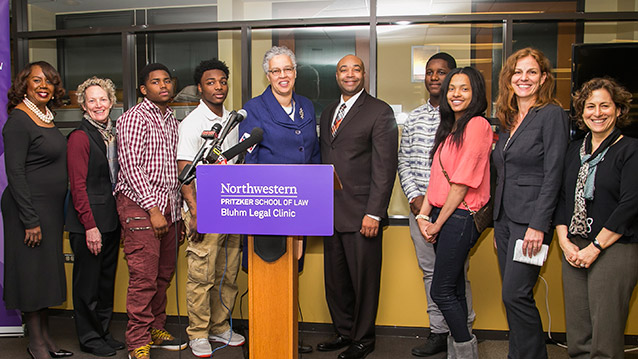CHICAGO --- Cook County Board President Toni Preckwinkle talked Monday at a Northwestern University Pritzker School of Law event about a proposed bill in Illinois that will make it easier to get juvenile arrest records expunged and combat unlawful and broad sharing of such records in Illinois.
Preckwinkle was joined by state lawmakers, youths impacted by the current state of juvenile records expungement and juvenile justice advocates, including those from Northwestern Law’s Children and Family Justice Center (CFJC)
CFJC collaborated with the Juvenile Justice Commission to research and write a report titled “Burdened for Life: The Myth of Juvenile Record Confidentiality and Expungement in Illinois,” the basis of the proposed legislation.
“By strengthening confidentiality protections for juvenile records and creating greater access to the expungement process, the act brings our laws in line with best practices recently set forth by the American Bar Association,” said Carolyn Frazier, clinical assistant professor of law and CFJC staff attorney.
“This act will help thousands of young people in Illinois each year by making it easier for them to find a job, obtain housing and pursue an education. It will also improve public safety,” she said.
The Youth Opportunity and Fairness Act (HB 3817/SB 2021) would bring the state’s current juvenile records laws in line with the American Bar Association’s model guidelines on youth records.
Data collected by the CFJC and the commission demonstrate that Illinois has done a poor job in expunging juvenile records. In the past decade, less than three in 1,000 -- 0.29 percent -- of juvenile records were expunged in Illinois due to procedural hurdles that prevented expungement petitions from being filed. Half of the state’s counties did not grant a single juvenile expungement in the past decade.
“It’s time we recognize that the arrest records of young people who have made only minor mistakes can serve as impediments to their future growth and development, and even create obstacles to such basics as finding housing and employment as they get older,” Preckwinkle said. “I am grateful to Representative Nekritz and Senator Hastings for their advocacy on this measure, which continues our efforts at reforming antiquated and damaging juvenile justice laws.”
This act will help thousands of young people in Illinois each year by making it easier for them to find a job, obtain housing and pursue an education. It will also improve public safety.”
clinical assistant professor of law
The report upon which the legislation is based points to research that shows how detrimental juvenile records can be for vulnerable youth trying to build productive lives, increasing their risk of returning to criminal activity.
Sponsored by Illinois State Rep. Elaine Nekritz, D-Northbrook, and State Sen. Michael Hastings, D-Orland Hills, the bill, which will be introduced in the Illinois State House and Senate, would automatically expunge the records of juvenile arrests that do not result in charges. In cases that do result in findings of delinquency, records would be automatically expunged two years after the youth’s case is closed, but only if a new finding of delinquency does not occur during that two-year period.
In another major aspect of the bill, confidentiality rules would be enhanced and penalties would be established for unlawful sharing of juvenile records (Class B misdemeanor resulting in a $1,000 fine and any actual damages).
Part of the Bluhm Legal Clinic at Northwestern Law, the Children and Family Justice Center is a comprehensive children’s law office. Attorneys and law students work together to promote justice for children, adolescents and their families through direct legal representation, policy advocacy and law reform. Julie Biehl, CFJC director, was appointed to the Illinois Juvenile Justice Commission in 2010.


